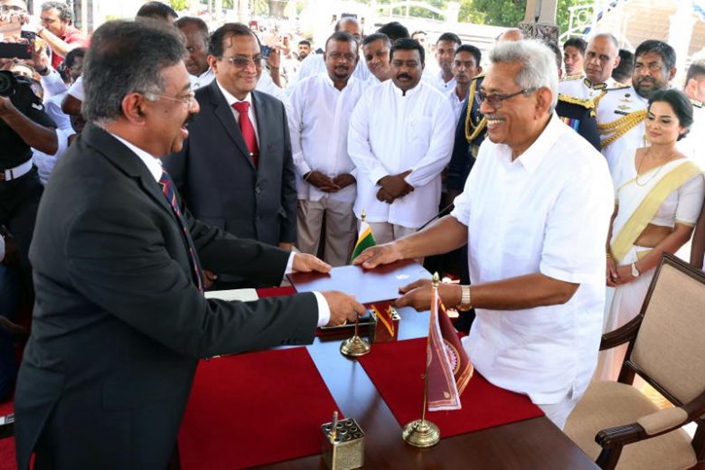India Concerned New Sri Lankan President May Tilt Toward China

(The Straits Times) — Sri Lanka’s new president Gotabaya Rajapaksa said he will remain “equidistant” with all countries and “neutral in the power struggles amongst nations.”
Yet as Rajapaksa takes over the reins of a country that is strategically located in the Indian Ocean and firmly wooed by China, there is some trepidation in India over whether Chinese influence will increase.
Prime Minister Narendra Modi was among the first to congratulate Rajapaksa and invited him to visit India, an invitation that the Indian Prime Minister’s Office said had been accepted.
India has moved fast to reach out to the new president. On Nov. 19, India’s External Affairs Minister S. Jaishankar was in Sri Lanka to hand over a formal invitation letter and congratulate Rajapaksa, who was sworn in on Monday.
The president’s visit to India has been fixed for Nov. 29, Jaishankar said.
“A warm meeting with Sri Lanka President @GotabayaR. Conveyed PM @narendramodi’s message of a partnership for shared peace, progress, prosperity & security. Confident that under his leadership, #IndiaSriLanka relations would reach greater heights,” he tweeted.
Indian analysts said there would be no immediate upheavals between the two sides in spite of the history of turbulent relations between the Rajapaksa family and India.
Rajapaksa’s brother Mahinda Rajapaksa had tilted towards China at the expense of ties with India during his 10-year-long tenure as president which ended in 2015.
Gotabaya Rajapaksa was the defense secretary in charge of military affairs in that government and has in the past accused India of interfering in Sri Lanka’s internal matters.
“I think it will be cautious but no upheavals are expected immediately,” said South Asia expert S.D. Muni, who said ties would depend on how Rajapaksa approaches Tamil minorities, shapes ties with China and deals with allegations of human rights violations at the end of the civil war.
“It is very, very clear that he hasn’t been voted by Tamils. He knows it and has underlined it. How he treats them (is a factor). I think both sides will go cautiously and be careful not to tumble on these factors,” Muni added.
Sri Lanka emerged from a civil war in 2009 that claimed over 70,000 lives across three decades.
The Liberation Tigers of Tamil Eelam, which ran a military campaign for a separate Tamil homeland, was defeated by the Sri Lankan armed forces.
In recent years, however, Sri Lanka has been shaken by political instability as a result of infighting among its leaders and economic troubles, including debt from billions of dollars of loans from China.
The country also suffered a terrifying terror attack on April 21 this year when three churches in the country and three luxury hotels in the commercial capital Colombo were targeted in a series of coordinated terrorist suicide bombings. The attacks killed 259 people.
Rajapaksa’s past record as a military strongman and the promise of stable government are seen to have helped sway voters, particularly among the majority Sinhala population which has in the past supported the Rajapaksa political family.
China has had a particular interest in Sri Lanka — much to India’s alarm — given the country’s location along important sea lanes of communication in the Indian Ocean.
Yet analysts in Sri Lanka said much would depend on how the new president tackled pressing economic issues.
“Sri Lanka’s foreign relations are likely to remain neutral vis a vis the larger powers under President Gotabaya Rajapaksa. All the more so since the previous Rajapaksa government in alienating the West and India found itself isolated,” said Ahilan Kadirgamar, senior lecturer at the University of Jaffna in Sri Lanka.
“However, as Sri Lanka’s ongoing debt and economic problems mount, there might be a tilt towards avenues of financial support, whether it is bilateral actors, multilateral agencies or the capital markets.
“The focus of the Rajapaksa government as it consolidates power will be domestic policies, including drastic economic measures seeking to bring in investment and stimulate growth centred on infrastructure and urban development, which won’t be possible without dispossession of rural livelihoods and further cuts to social welfare.”
Others believed much depended on how the West in particular dealt with the new Sri Lankan president, who has faced allegations of presiding over human rights abuses and silencing dissent during the last years of his brother’s tenure.
“The president has stated at his swearing in that he intends Sri Lanka to be neutral and not get involved in any great-power conflict,” said Paikiasothy Saravanamuttu, founder and executive director of the Centre for Policy Alternatives in Sri Lanka.
“What this would entail, nevertheless, is falling back on China if the Western-oriented international community raises human rights and accountability issues and the government feels besieged.”
This story was originally published by The Straits Times
Contact editor Yang Ge (geyang@caixin.com)

- 1In Depth: China’s Sweeping Banking Law Rewrite Targets Hidden Risks
- 2China Business Uncovered Podcast: A $15 Billion Bitcoin Seizure and the Fall of a Cybercrime Kingpin
- 3In Depth: Inside the U.K.’s China-Linked Shell Company Factory
- 4Over Half of China’s Provinces Cut Revenue Targets
- 5Li Ka-Shing’s Port Empire Hit by Forced Takeover Amid Panama Legal Dispute
- 1Power To The People: Pintec Serves A Booming Consumer Class
- 2Largest hotel group in Europe accepts UnionPay
- 3UnionPay mobile QuickPass debuts in Hong Kong
- 4UnionPay International launches premium catering privilege U Dining Collection
- 5UnionPay International’s U Plan has covered over 1600 stores overseas



